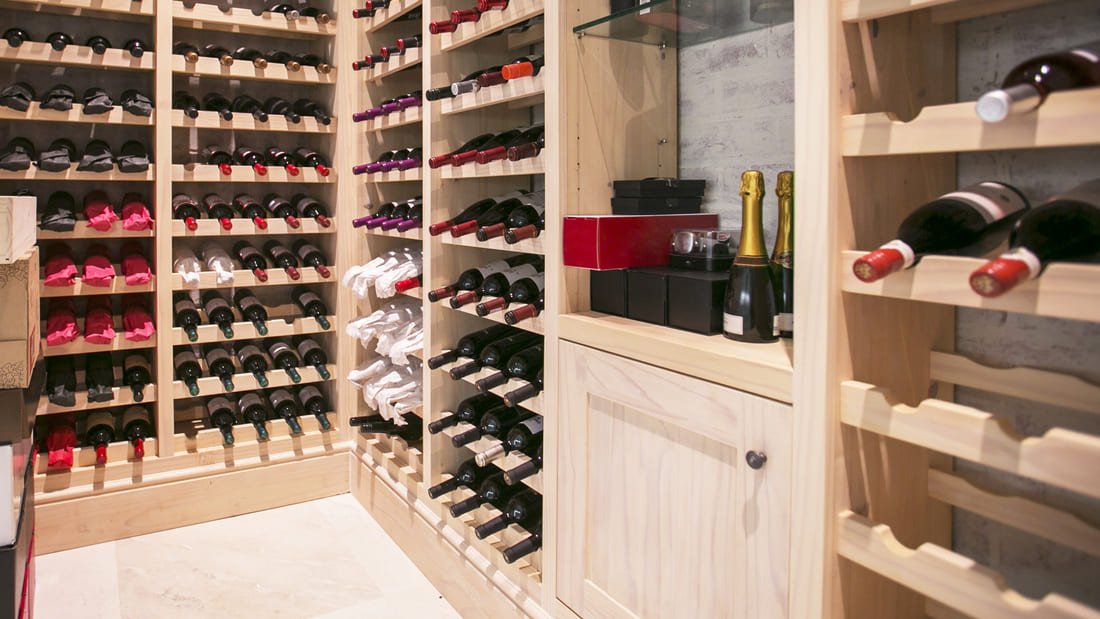
25 Aug Are Wine Cellars And Wine Storage The Same Thing?
Fine wines are a cherished delight, but their delicate nature demands meticulous care to preserve their flavour profiles and aromatic nuances. As wine enthusiasts and collectors seek to safeguard their investments, the terms “wine cellars” and “wine storage” often emerge in discussions.
While these terms are sometimes used interchangeably, they refer to two distinct concepts that play a crucial role in maintaining the quality of wines. Let’s look at the differences between wine cellars and wine storage, shed light on their unique features, and guide readers towards making an informed choice based on their specific needs.
Understanding Wine Cellars And Wine Storage
At first glance, the aim of wine cellars and storage might seem identical: to protect and enhance the aging process of wines. However, a closer examination reveals their divergent approaches to achieving this shared objective.
Wine cellars and wine storage are complementary components of the broader realm of wine care, each catering to different requirements while upholding the integrity of the cherished vintages.
An In-Depth Insight Into Wine Cellars
The concept of wine cellars dates back centuries, rooted in the history of wine production and the desire to safeguard wines from the passage of time. Wine cellars, as purpose-built storage areas, offer a controlled environment essential for preserving wines’ quality over the long term. These spaces are designed to maintain optimal temperature, humidity, and lighting conditions.
Regarding wine cellars, various types cater to diverse preferences and spaces. Traditional wine cellars evoke a sense of nostalgia, often located underground, harnessing the earth’s natural insulation. Contemporary wine cellars, on the other hand, seamlessly integrate technology to ensure precise temperature and humidity control, allowing enthusiasts to curate their collections with modern convenience. Built-in and walk-in wine cellars provide options for those wishing to allocate space within their homes to showcase their prized wines.
Creating a wine cellar demands an investment of both financial resources and space. However, the rewards are substantial: a well-constructed cellar safeguards wines from external factors and becomes a testament to the owner’s dedication to the craft.
Beyond The Basics Of Wine Storage
Wine storage, a broader term encompassing various methods of preserving wines, acknowledges that not all enthusiasts can establish a dedicated wine cellar. Wine storage solutions cater to a broader audience, offering alternatives that balance functionality and space constraints.
The essence of adequate wine storage lies in ensuring a stable environment. Like wine cellars, temperature and humidity control remain paramount. Maintaining a consistent temperature prevents fluctuations that can prematurely age the wine.
Humidity control safeguards the integrity of the corks, preventing them from drying out or becoming overly moist. Additionally, proper bottle orientation and minimal vibration minimize the risk of sediment disturbance and chemical reactions that could compromise the wine’s quality.
Wine storage solutions include wine refrigerators, which provide a controlled environment on a smaller scale, making them suitable for apartments and smaller homes. Wine cabinets offer a similar controlled environment and are often designed as stylish furniture that seamlessly blend into various interior aesthetics; for those seeking to entrust their collections to professionals, professional wine storage facilities offer secure, climate-controlled spaces where wines can age gracefully.
Factors To Consider While Choosing Wine Storage
Deciding between a wine cellar and wine storage depends on various factors that cater to individual circumstances. Available space, budget, collection size, long-term goals, and personal preferences all play a role in making this decision. For those with ample space and a commitment to wine collecting, a wine cellar offers the opportunity to create a dedicated haven for wines. Conversely, wine storage solutions cater to those seeking an effective and convenient way to preserve their wines within their available space.
Best Practices For Maintaining Wine Quality
Irrespective of the chosen method, there are fundamental practices that enthusiasts can adopt to ensure the long-term quality of their wines:
- Avoid Direct Sunlight
- Temperature Consistency
- Bottle Orientation
- Regular Inspections
- Organizational Excellence
As you can see, there are significant distinctions between wine cellars and storage. While both options contribute to preserving the integrity of wines, they cater to different needs and constraints. Whether you opt for the grandeur of a wine cellar or the convenience of wine storage, the ultimate goal remains the same: to savour wines at their finest.
If you want more information about our wine cellar design and installation, please contact us. We will provide you with custom plans and services.




No Comments